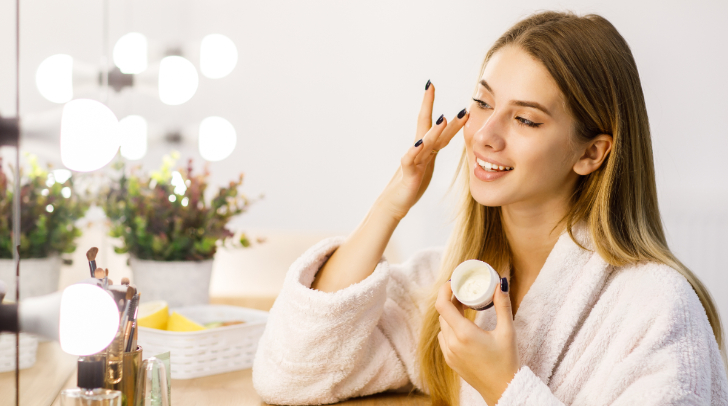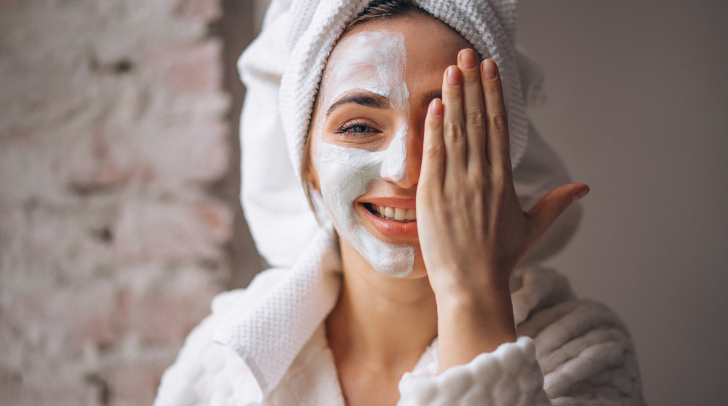As summer approaches, prioritising hydration for your body is crucial, but don't forget about your skin's health. Excessive heat and harmful UV rays can tan your skin and compromise its barrier, leading to issues like fine lines, pigmentation, and uneven tone. However, you don't need to worry, as Connector spoke with skincare experts to guide you on essential summer skincare practices and must-dos to maintain healthy skin.
Follow A Healthy Diet
Maintaining a healthy diet is crucial for naturally glowing skin in the summer months, alongside a solid skincare routine. What you eat and how much water you drink directly impact your skin's appearance. Adequate hydration and a balanced diet rich in fruit and vegetables, particularly those high in antioxidants, are essential for skin health.
Mukta Purain, Founder of MissPalettable.com, emphasises the importance of these factors for achieving radiant skin during the summer season, and says, "Hydration and diet are crucial for summer skin health. Drinking at least two litres of water daily, with added electrolytes when outdoors, keeps skin hydrated and resilient against sun exposure. Water flushes toxins, benefiting acne-prone skin. Opt for lighter, fresh foods like berries, citrus, tomatoes, cucumbers, and watermelon rich in antioxidants to protect and hydrate from within during the summer heat."
Highlighting the importance of omega-3 fatty acids, Dr Parul Thakur, Co-Founder of Athena Dermatology, adds "Omega-3 fatty acids found in foods such as fish, flaxseeds, and walnuts help maintain the strength and hydration of skin cell membranes. To prevent acne, especially more common in summer due to heat and humidity, it's crucial to limit excess sugar and processed foods, which can clog pores. Opt for hydrating foods like cucumbers, melons, and celery to support overall hydration levels in the body."
Cleanse, Hydrate And Exfoliate
During summer, focus on a basic skincare routine. Keep it simple, cleanse thoroughly, hydrate with a toner and serum, and always apply sunscreen for protection. These essential steps will help maintain your skin's natural oils and health.
Mukta Purain of MissPalettable.com adds, "When adjusting your summer skincare routine, consider sun exposure, increased sweat and oil production, and dehydration. Begin by cleansing thoroughly to remove sweat and oil build-up. Follow with a hydrating toner to replenish moisture and balance pH levels. Incorporate a hydrating serum like Hyaluronic Acid and choose lightweight, gel-based for oily skin or water-based moisturisers for dry skin."
Dr Ankita Tuknayat, Specialist Dermatology, Aster Clinic, Sheikh Zayed Road, says, "Exfoliation is crucial for maintaining healthy, radiant skin, especially during the summer when heat, humidity, and increased exposure to the sun can lead to clogged pores and dull skin. Exfoliate once or twice a week to
remove dead skin cells and prevent clogged pores. Opt for a gentle exfoliator, such as a mild scrub or a chemical exfoliant with alpha-hydroxy acids (AHAs) or beta-hydroxy acids (BHAs). Exfoliate in the evening to avoid immediate sun exposure, as freshly exfoliated skin can be more sensitive to UV rays. Exfoliate using products depending on your skin type. If you have oily or acne-prone skin, BHAs like salicylic acid are effective for penetrating and cleaning out pores, making them ideal for oily or acne-prone skin. If your skin is dry or sensitive, AHAs like lactic acid are milder and can provide hydration while exfoliating."
Dr Ruhil Badiani, Family Physician at Cornerstone Clinic suggests that for cleansing one should start with a mild cleanser to eliminate sweat, excess oil, and impurities. Opt for a foaming or gel-based cleanser that effectively cleanses without compromising the skin's natural moisture barrier.
For exfoliation, Dr Ruhil Badiani at Cornerstone Clinic adds, "Exfoliation is essential for summer skincare, aiding in the removal of dead skin cells, unclogging pores, and promoting a radiant complexion. However, it's crucial to exfoliate wisely to prevent irritation, especially with increased sun exposure. Make sure you select a gentle exfoliant, form a routine for exfoliation, and add a soothing moisturiser after exfoliation. Lastly, post-exfoliation, refrain from using other potentially irritating products such as retinoids or high-concentration vitamin C serums immediately. This helps prevent irritation and preserves a healthy skin barrier."

Sunscreen Is An Essential Must-Have
When it comes to summer skincare, sunscreen is a non-negotiable essential. Whether you're indoors or outdoors, applying sunscreen is crucial.
Dr Ankita Tuknayat, Aster Clinic, adds, "Sunscreen protects the skin from harmful ultraviolet (UV) rays. Ultraviolet A (UVA) rays penetrate deeply, causing premature ageing, while ultraviolet B (UVB) rays cause sunburn. Regular use of sunscreen reduces the risk of developing skin cancers, including melanoma, squamous cell carcinoma, and basal cell carcinoma. Sun exposure accelerates skin ageing, leading to wrinkles, fine lines, and age spots. Sunscreen helps prevent these signs of ageing by blocking harmful UV rays. Sunscreen is essential for all skin tones, as UV damage affects everyone. It helps prevent hyperpigmentation and uneven skin tone. Choose a water-resistant sunscreen with a Sun Protection Factor (SPF) of at least 30. Apply at least 30 mins before stepping out of the house. Reapply every two hours and more frequently if you swim or sweat. Apply even on cloudy days."
Dr Parul Thakur of Athena Dermatology, adds, "Sunscreen plays a crucial role all year long but especially in summer when the UV index is high and the sun is shining for a longer time. In addition to applying sunscreen to your face and hands, it's important to wear sun-protective clothing, use sun shields, and don broad-brimmed hats. Don't overlook the necessity of using lip balms with SPF to maintain hydration and protect your lips."
Highlighting the importance, Dr Ruhil Badiani at Cornerstone Clinic says, "Sunscreen acts by absorbing or reflecting UVB rays, the primary culprits behind sunburns. By preventing sunburn, sunscreen effectively reduces immediate skin damage and minimises the risk of painful, potentially blistering burns. Furthermore, sunscreen plays a crucial role in preventing hyperpigmentation and dark spots, conditions worsened by sun exposure. This protection is especially vital for individuals susceptible to melasma or post-inflammatory hyperpigmentation. For optimal effectiveness, it is recommended to apply sunscreen generously to all exposed skin areas at least 15 minutes before exposure to sunlight."
Carry A Facial Mist While Travelling
If you're travelling or always on the move during summer, having a facial mist is essential. It provides instant hydration and works well for all skin types. Whether your skin feels dry or needs moisture, a few sprays of facial mist can leave it hydrated and glowing. Facial mists contain soothing ingredients that rehydrate and moisturise your skin, making them ideal for outdoor use when washing your face frequently isn't convenient. It's a handy way to refresh and soothe your skin throughout the summer.
Highlighting the importance of facial mist, Dr Ruhil Badiani at Cornerstone Clinic adds, "Throughout the day, use a hydrating facial mist to refresh and soothe the skin. Look for mists with ingredients like aloe vera and chamomile."
Learn To Beat The Humidity
Sun rays are harmful, and so is humidity. While we can't control humidity levels, there are tricks we can adopt to mitigate its effects. Dr Ankita Tuknayat, Aster Clinic, adds, "Humidity affects the skin in various ways. High humidity can increase oil production, leading to shiny skin and potential breakouts. Sweating can dehydrate skin and mix with oils, causing irritation and clogged pores. Those with sensitive skin like eczema or rosacea may experience heightened irritation. To counter these effects, cleanse twice daily, exfoliate weekly, and use hydrating serums with ingredients like hyaluronic acid. Stay hydrated and use non-comedogenic, oil-free moisturisers. Always apply SPF 30 sunscreen and choose mattifying products to control shine and maintain a fresh look."

Carry Skin Care Even On Flight
Dr Parul Thakur of Athena Dermatology, says, "Flying can be very dehydrating, and often we underestimate the UV exposure from flight windows. Stay hydrated throughout the flight and moisturise your skin thoroughly. Consider using hydrating masks and mists during the flight. If seated by a window, apply SPF or keep the blinds closed to protect your skin from UV rays. Temperature changes during travel can affect your skin, so rely on moisturiser and sunscreen to keep it protected. Cleansing your skin, especially after a day outdoors, is crucial during travel."
Post-Sun Care Is A Must
After being in the sun, it's important to follow a post-sun care routine. Start by using a makeup remover to clean off makeup, dirt, and oil from your skin. Follow this with a cool shower to soothe your skin. In summer, applying aloe vera gel is beneficial; choose one suited to your skin type. Additionally, use a hydrating face mask once a week. Face masks with Vitamin C address various skin concerns and offer a refreshing boost tailored to your skin's needs.
"After a day in the sun, use soothing products like aloe vera gel or a calming mask to address any sun-induced irritation or redness," adds Dr Ruhil Badiani at Cornerstone Clinic.